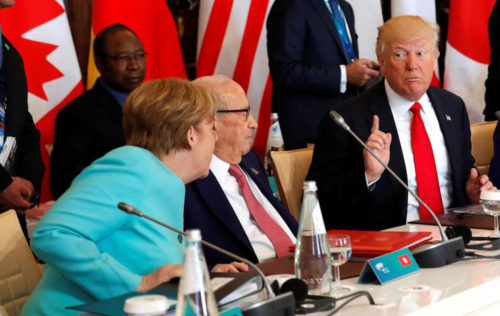BERLIN (Reuters) – German Chancellor Angela Merkel underlined her doubts about the reliability of the United States as an ally yesterday but said she was a “convinced trans-Atlanticist”, fine-tuning her message after surprising Washington with her frankness a day earlier.
In a speech in Berlin, Merkel showed how seriously she is concerned about Washington’s dependability under President Donald Trump by repeating the message she delivered a day earlier that the days when Europe could completely count on others were “over to a certain extent”.
She made those comments, which sent shock waves through Washington, after Trump criticised major NATO allies over their military spending and refused to endorse a global climate change accord at back-to-back summits last week.
“Recent days have shown me that the times when we could rely completely on others are over to a certain extent,” Merkel said.

While she made clear Berlin and Washington would “of course” remain close partners, Merkel stuck to her language from Sunday.
“We also know that we Europeans must really take our fate into our own hands,” she added, underlining Europe’s frustration with Trump on climate policy in particular.
The American tycoon-turned-president backed a pledge to fight protectionism at the end of a summit of the G7 group of wealthy nations on Saturday. But he refused to endorse the climate pact, saying he needed more time to decide.
Merkel added that ties with the United States were of “paramount importance”, but she otherwise stuck to the thrust of her Sunday message, when she spoke in a packed Munich beer tent.
“It became clear at the G7, when there was no agreement with the USA, how long and rocky this path would be,” Merkel said at a conference on sustainable development. “I think it was good not to gloss over the differences.”
Merkel indirectly warned Trump he risked isolating the United States: “Anyone who today puts on national blinkers and no longer has eyes for the world around him is, I am convinced, ultimately out on a limb.”
Her spokesman, Steffen Seibert, told reporters Merkel felt it was right to flag differences in Germany’s ties with the United States in order to maintain healthy relations.
“Because trans-Atlantic relations are so important to this chancellor, it is right from her viewpoint to speak out honestly about differences,” he said, stressing that the trans-Atlantic ties “are a firm pillar of our foreign and security policy”
Interior Minister Thomas de Maiziere stressed Germany’s “excellent” security ties with the United States.
Nonetheless, Merkel’s plans to meet Indian Prime Minister Narendra Modi and Chinese Premier Li Keqiang this week reflect Berlin’s willingness to work with other countries if Washington proves problematic on climate and trade policy.
German Foreign Minister Sigmar Gabriel said the West had become weaker as Washington increasingly put US interests first. He said Trump’s administration, for example, was unlikely to do much to tackle the causes of the migrant crisis – climate change, wars and persecution.
He referred to the “loss of the US as an important nation” and said that while it was important to maintain dialogue with Washington, Europe needed to become stronger and Germany needed to be more prepared to work with its EU peers.
Juergen Hardt, the German government’s coordinator for transatlantic policies, said Trump’s administration was irritating foreign allies.
“Never before has there been so much uncertainty about the political course, and so many contradictions in the president’s statements, four months after the inauguration of a new US president,” Hardt told Reuters.
“That weakens America and irritates its partners,” said Hardt, the foreign policy expert in parliament for Merkel’s conservative Christian Democrats.








